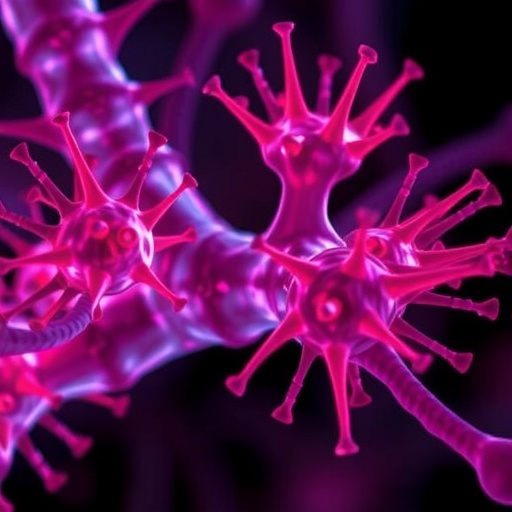In a groundbreaking study, researchers from the La Jolla Institute for Immunology (LJI) and Columbia University Irving Medical Center have unveiled compelling evidence that the enigmatic neurodegenerative disorder amyotrophic lateral sclerosis (ALS) may, in fact, be driven by an autoimmune mechanism. ALS, which afflicts approximately 5,000 individuals annually in the United States, is characterized by a devastating progression leading to respiratory failure in the majority of patients within 14 to 18 months of diagnosis. Despite decades of research, the underlying cause of ALS has remained elusive until now.
The collaborative investigation centered on the role of CD4+ T cells—critical players in the immune system’s adaptive response—in patients afflicted with ALS. These immune cells were found to aberrantly target C9orf72, a protein highly expressed in neurons, effectively marking the nervous system as a target for immune-mediated attack. This self-reactivity underscores a fundamental characteristic of autoimmune diseases, where the body’s defense system erroneously recognizes its own proteins as foreign invaders.
Alessandro Sette, Ph.D., a co-lead on the study from the LJI, emphasized the novelty of these findings: “For the first time, we have unequivocal evidence demonstrating that ALS involves an autoimmune response targeting specific neuronal proteins.” Partnering with Columbia’s David Sulzer, Ph.D., the team used advanced immunological assays to detect heightened levels of inflammation-promoting CD4+ T cells in ALS patients, specifically those reactive against the C9orf72 protein. This discovery shifts the paradigm of ALS research by implicating immune dysregulation as a central contributor to disease pathology.
Surprisingly, the research delineated two distinct subpopulations among ALS patients based on their immune profiles. One subset exhibited highly inflammatory CD4+ T cell responses to C9orf72, correlating with shorter predicted survival times. Conversely, a second group demonstrated a more balanced immune signature, characterized by both inflammatory and regulatory, or anti-inflammatory, CD4+ T cells. These regulatory cells are paramount in mitigating excessive immune activation, thereby potentially slowing neuronal degradation and extending patient longevity.
This immunological dichotomy offers a plausible explanation for the perplexing heterogeneity in ALS progression. Notably, public figures such as Lou Gehrig succumbed rapidly to the disease, while others like Stephen Hawking defied odds by surviving for decades post-diagnosis. The newly identified protective role of regulatory CD4+ T cells suggests that modulating these immune components could become a strategic therapeutic avenue to prolong survival and enhance quality of life for ALS patients.
Further mechanistic insights reveal that under normal circumstances, the immune system balances aggressive responses to eliminate pathogens with counteracting signals that restrain immune activity, thus preserving healthy tissue integrity. ALS patients with longer survival times appear to maintain this delicate immunological equilibrium, where anti-inflammatory T cells temper the destructive potential of their inflammatory counterparts.
Looking forward, the research community anticipates harnessing these insights to develop targeted immunotherapies aimed at augmenting regulatory CD4+ T cell responses while damping harmful inflammation in ALS. Tanner Michaelis, the study’s first author and LJI research technician, highlighted the potential impact of these findings: “Identifying C9orf72 as a specific immune target opens new horizons for treatment strategies that are far more precise than current approaches.”
Moreover, the implications of this research transcend ALS, with co-leader Alessandro Sette proposing that similar autoimmune phenomena may underpin other neurodegenerative disorders, including Parkinson’s, Huntington’s, and Alzheimer’s diseases. This aligns with the emergent field of neuroimmunology, where accumulating evidence implicates immune components in the pathogenesis of multiple neurologic conditions previously thought to be purely degenerative.
The study builds on prior discoveries from the Sette Laboratory that connected autoimmunity and Parkinson’s disease, reinforcing the concept that immune dysregulation is a common denominator in neurodegeneration. Sette stated, “The involvement of immune cells in neurodegenerative diseases is becoming more of a rule than an exception, fundamentally altering our understanding of these pathologies and opening avenues for immune-based interventions.”
This landmark work was recently published in the prestigious journal Nature, signifying a major milestone in neuroimmune research. It was supported by multiple funding sources, including LJI & Kyowa Kirin, the Swedish Research Council, the Freedom Together Foundation, and the National Institute of Neurological Disorders and Stroke, underscoring the broad scientific interest and significance of these findings.
As the field advances, researchers remain cautious yet optimistic, recognizing that translating these discoveries into clinical therapies will necessitate rigorous testing and validation. Nonetheless, the identification of a direct autoimmune response against a neuronal protein in ALS patients marks a paradigm shift that promises to transform diagnostic and therapeutic approaches, offering renewed hope for patients facing this relentless disease.
Subject of Research: Cells
Article Title: Autoimmune response to C9orf72 protein in amyotrophic lateral sclerosis
News Publication Date: October 1, 2025
Web References: http://dx.doi.org/10.1038/s41586-025-09588-6
References: Alessandro Sette, David Sulzer et al., Nature, 2025
Image Credits: La Jolla Institute for Immunology
Keywords: Neuroscience; Immunogenetics; Immunology; Immune cells; Effector cells; Effector T cells; Immune disorders; Autoimmune disorders; Antigens; Neoantigens; Immune response; Adaptive immune response; T cell activation; Immunoreactivity; Neurons; Amyotrophic lateral sclerosis; Neurological disorders; Neurodegenerative diseases; Neuropathology; Diseases and disorders; Human health; Human biology




